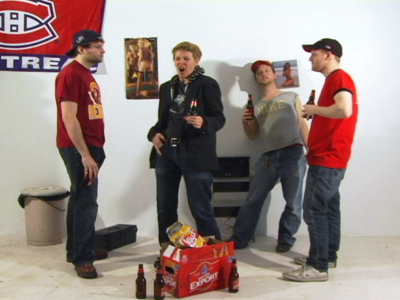Robert Lendrum
In what way did your experience at The Department of Visual Arts at Western impact you & your career path?
The Department of Visual Arts at Western opened my eyes to the world of experimental video art and media production. I started to see new possibilities for video and began exploring new modes of storytelling and presentation. As someone who came from a small town many of the things we were exposed to in our first year were radical and proved to be formative to my consciousness.
How have you been contributing to your community following your experience at Western?
I was involved in my graduate school elected representation and I did a volunteer internship at the Images Festival in Toronto. I worked for an Artist-Run Centre for a few years.
Can you think back and share a memorable moment from your time here at Visual Arts?
Among my best experiences at Western was the organizing and executing of our graduating thesis show “FINA” (2002). Under the supervision of David Merritt and Susan Schuppli, we rented a dilapidated mansion and took over
What was the most important thing you learned during your time here?
During my undergrad, I learned to think critically especially around media and around the way media objects are created and disseminated. I learned to consider what underlying power dynamics are at work in any media creation, to identify the stakeholders, and to examine the context that informs the presentation of a media text.
What is something you are passionate about? What are you working on right now?
I was an active artist working in video, performance, and documentary up until 2014. At that point, I started focusing on a career as Producer for Roger’s Sportsnet where I work on NHL Properties. I would say I’m very passionate about my job and feel fortunate to work where I do. I hope at some point to work on more projects - especially documentary - where I can bring the skills I’ve learned in the workforce back to my own creative practice.
Why do you think a career in the Visual Arts is important/valuable?
I would always stress that taking Visual Arts does not necessarily mean you will have a career in the visual arts. However, it will equip you with the ability to comprehend and be critical of visual art and media making strategies. If you are an image maker or storyteller in any way, the Visual Arts program can help prepare you by teaching you the building blocks and basics of making those images or telling those stories. It is important to our society to have trained people who understand how images are made, contextualized and disseminated because they carry political meaning.
What would your hopes be for the next 50 years of Visual Arts at Western?
I would like to see Western lead the way in breaking out of the rigid thinking around art belonging in the gallery or museum. I think that kind of classical thinking is long dead and needs to be contextualized as historical. Many of today’s most important artists and media makers are working outside these spaces and often look to separate themselves from the art world. Digital and online art, app development, A.I., political activism are all important forms of media that are often considered outside of “art”, yet they all borrow strategies and tactics from artists of the past. This movement away from “white cube” presentation would push students to think towards the most important emergent technologies, how these technologies will affect representation, and what role art can play in society. This direction would also serve the large body of students at Western who never end up working in the arts, but rather end up working in mainstream media, broadcasting or advertising.







